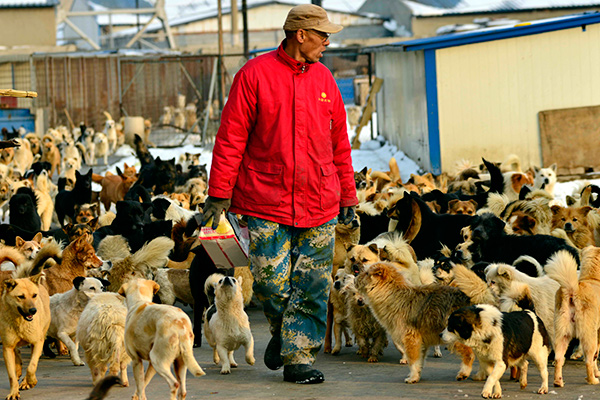
On Feb 8, a week before Chinese New Year, an anonymous donor sent 6 tons of dog food to a stray dog facility in Yantai, Shandong province, which was a big relief for Wang Chunhong who runs the rescue center.
“With this food, we don’t need to worry about them not eating during the holiday,” said Wang, who estimated that the donated food was worth at least 30,000 yuan ($4,760).
Food, rental, healthcare and epidemic prevention costs and other incidentals largely originate from charitable donations, said Wang, who founded the center.
“Many local residents have sent money or food here as Spring Festival approached,” said Wang, who opened the donation site on her WeChat and showed that over 10 people donated on a single day with funds ranging from 1 to 100 yuan.
Covering an area of 8.5 mu (5,660 square meters), the 150 rudimentary pens are home to more than 2,500 stray dogs, ranging from a few months to 10 years old.
At the sight of a stranger, the dogs will gather around, barking but not particularly threatening. Their eyes betray their fear and melancholia.
“It is because most are abandoned, and some disabled, which makes them eager for love,” Wang said.
“There are only six people-the youngest 56 and the oldest 63-working here to take care of the dogs, including feeding, cleaning, sorting out and even breaking up skirmishes,” she said.
Wang lives at the center with her husband, Song Ruilai, 60. There is hardly any time for them to rest all year round and the couple has little time to visit human family members.
Song said his wife once raised a dog which died after 14 years. In order to see the dog every day posthumously, she even asked a taxidermist to stuff her beloved pooch.
Inspired by others, she opened her stray dog center in 2011 and has since become famous, earning the affectionate nickname “dog mother” by locals, an appellation she accepts with pride, Song said.
“In summer, it smells bad,” she said, “I can understand why few are able to bear the workload and the environment here.”
It started with several hundred dogs, and seven years later there are more than 2,500 in her compound.
At the beginning, there was no processed dog food, so we had to spend hours cooking for the dogs. When the dogs had their meal, we were still hungry, she said.
For Wang, the hard work is bearable, but her anxiety for the dogs’ survival prospects tortures her heart.
Last year, we ran out of money to pay for rent and dog food. The famished dogs were so hungry they sometimes bit each other-leading to over 10 deaths, she said.
Even when she is sleeping, Wang dreams of raising money for the dogs. The facility’s daily cost is a minimum of 4,000 yuan, and totals some 1.5 million a year.
“At the most difficult times, people even suggested euthanasia for some dogs to reduce costs,” said Wang, “Luckily, help from society allows us to get through difficulties.”


